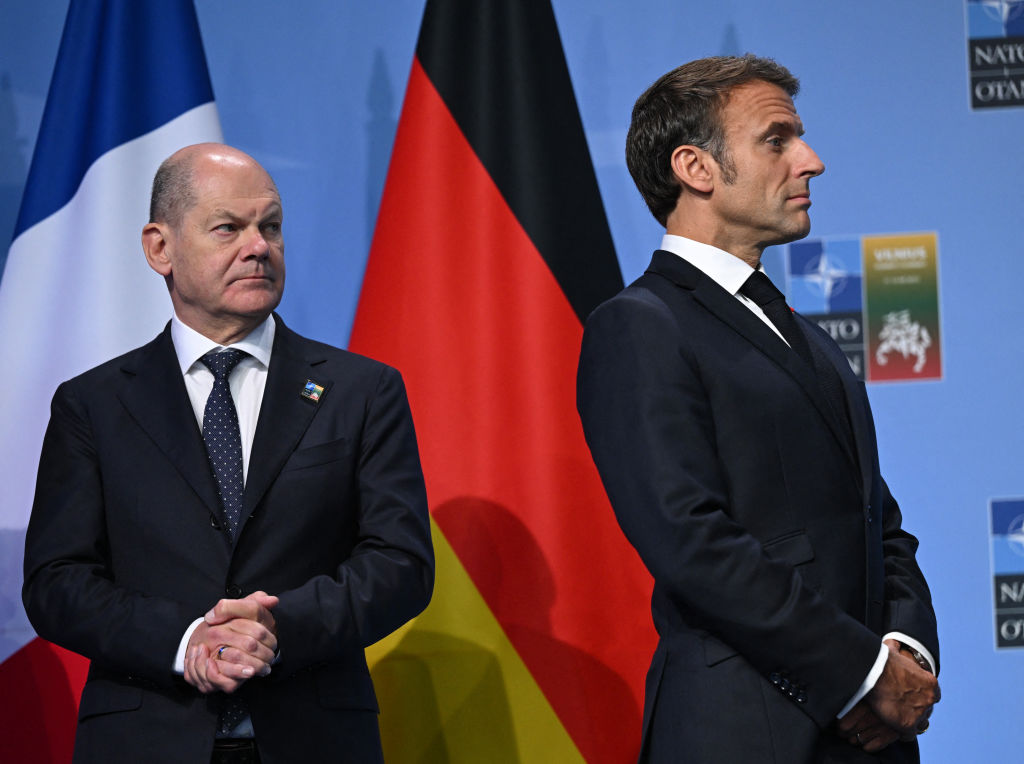What a difference 12 months can make. In February 2023, the Wall Street Journal detailed how the Russia-Ukraine war invigorated Nato. A year later, however, a growing number of cracks are appearing within the alliance.
Some of these issues have been around for a while, especially the constant haggling over who is meeting the required 2% of GDP spending requirement on defence. Only 11 out of 31 member countries are on target, and the laggards include such supposedly formidable states as France and Germany. These two cause a particular headache for other members, since they are unable to formulate a strategy vis-à-vis Russia that is supported by both ends of the Berlin-Paris axis.
German Chancellor Olaf Scholz has become the latest leader to expose these divisions, expressing reservations about sending Taurus cruise missiles to Ukraine and risking being drawn into a direct war with Russia. The fallout from his remarks has come just as the Chancellor deals with the embarrassment of a German military intelligence leak, which revealed that Britain may already have boots on the ground in Ukraine
France’s President Emmanuel Macron made headlines recently by suggesting that Western troops may be sent to Ukraine. He also mocked Scholz for sending “sleeping bags and helmets” instead of weapons, not an entirely fair claim given that, according to the Kiel Institute’s Ukraine Support Tracker, Germany has contributed around €17.7 billion in military, financial and humanitarian aid (only the US has provided more), compared to France’s meagre €635 million.
Unsurprisingly, Macron’s suggestion was rejected by almost all the other Nato states, but the damage was done. The moral and political leadership of France and Germany is being seriously questioned in Eastern Europe, where a revolution is brewing against the likely next secretary general of Nato, Dutch Prime Minister Mark Rutte. According to former Estonian President Toomas Hendrik Ilves, the question is “What moral credibility does this guy have?” — especially given the fact that during Rutte’s tenure the Netherlands has not once spent more than 2% of GDP on defence.
These divisions are running deep and play into Moscow’s hands, reviving Vladimir Putin’s most likely original strategy: bank on the Europeans — especially Germany — to accept a new status quo in order to keep Russian energy flowing.
Even now, Berlin is planning Europe’s largest expansion of gas power plants, and that gas must come from somewhere. Liquefied natural gas from Qatar and the US is helping, but as recent events in the Red Sea or President Biden’s opposition to US LNG export projects have demonstrated, diversifying energy risks will most likely include a continued trade relationship with Russia as one of many partners. Nord Stream 2 might be severely damaged, but one line is still functional and the rest can be repaired. This might seem unlikely now, but any assessment of a possible post-war order should include this likely possibility.
Macron was not entirely wrong, then, in his assessment of German hesitancy at the beginning of the war, and it took a lot of persuasion to commit Berlin to more vigorous support for Ukraine. Yet the French President’s behaviour plays into Putin’s hands as well. His idea of sending Western troops into a direct confrontation with Russia reinforces the Kremlin’s narrative that Ukraine is just a proxy war waged by Nato to “finish off” Russia. Last week’s leaked conversation between German Air Force officers has only exacerbated this.
The sum of these events reveals that Nato does not have a coherent plan of action, which also explains why Putin is in no rush to begin sincere negotiations about ending the war. Russia would be no match for an invigorated and unified Nato, but it can probably handle the alliance in its current condition.











Join the discussion
Join like minded readers that support our journalism by becoming a paid subscriber
To join the discussion in the comments, become a paid subscriber.
Join like minded readers that support our journalism, read unlimited articles and enjoy other subscriber-only benefits.
Subscribe